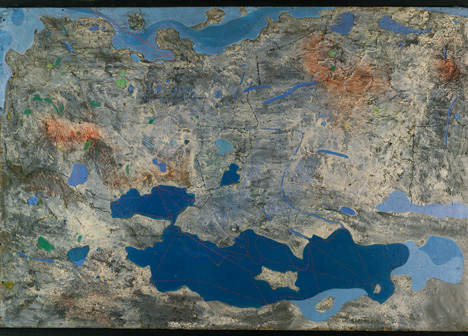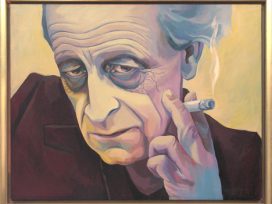
The sooner Europe gets used to a future without the nation-state, the better, writes Robert Menasse. Amnesia about what the unification project originally meant is causing a catastrophic lack of imagination about where it is heading.
Hegel once said: “The human being also dies out of habit.”
He wasn’t, of course, questioning the biological finitude of human life, but referring to the political and social nature of the human being. If one lives entirely in the everyday, eking out an existence “doing servile work, in which the tool has become autonomous, in other words a machine”, then this “dying out of habit” sets in, a “trembling in the face of social death”. This trembling is the final agitation of an historical movement that has run aground, because its intention and necessity, namely progress in the spirit of freedom, has been forgotten, and its goal, even if provisional, is seen as threatening to the familiar and hence repressed.

Max Ernst, Europe after the Rain I, 1933; oil and gypsum on plywood, 107 x 149 x 7 cm; Staatliche Kunsthalle Karlsruhe 2015 ProLitteris, Zürich. This work features in the exhibition. The exhibition was conceived by Cathérine Hug in close collaboration with Robert Menasse. Photo: Kunsthaus Zürich. Source: Kunsthaus Zürich
This passage from Elements of the Philosophy of Right describes very well the current moral situation of the European Union, in which rights are once again subject to habit, and which is a situation in the real sense, because it has halted the process of European unification. The only thing still moving here is sheer fear of the future, which expresses itself as resentment. When it takes to the streets, this resentment is called a movement, yet it is merely a caricatured necrology of the human being as zoon politikon.
Yet only half a century ago, the future was so bright. The picture of the future drawn by the founders of the European project was a masterwork of pragmatic reason in the spirit of the Enlightenment. It was radically bold and avant-gardist, while also based on historical experience and possessing elegant clarity and logic. Its political guidelines were human rights and, concretely, the human need for peace, social security, chances in life and opportunities for social participation. It was a project of life in dignity.
“The work of unity which we have begun, and which we work on daily, is no schematic idea projected blindly onto the future, no nebulous dream. Rather, it is a reality, because it is oriented towards the realities of Europe.” These words were spoken by Walter Hallstein, the first president of the European Commission, in a speech in Rome in 1964. Despite drawing much attention at the time, today it has been forgotten.
Reading Hallstein’s speech today and reconstructing the reality of the idea he spoke of, it is impossible not to be amazed and fascinated. It also reveals the origins of so many Europeans’ mortal fear of Europe.
So what were the “realities of Europe”? After a thirty-years war (1914-1945), Europe lay in ruins. Many could still remember the Franco-German war, the overture to Europe’s self-destruction. The people that now set out to rebuild Europe had seen that peace treaties and international alliances could not alone guarantee peace and lawfulness. So compelling was this experience that it was possible to convince people that lasting peace should be created in a new and entirely different way. But how? The founders of the European integration project had recognized the aggressor that had destroyed the continent’s infrastructure, that had caused suffering and misery for generations, that was responsible for the most horrendous crimes against humanity, all the way to Auschwitz. The aggressor was nationalism, the ideological self-aggrandizement of nations, the national arrogance that inevitably results in permanent conflict with the interests of other nations. These “national interests”, wrote Jean Monnet, “are nothing but the short-sighted economic interests of national elites, the satisfaction of which, in economic terms, involves writing off the national population, and the populations of other nations, as losses, and in real terms turning them into victims.”
Creating peace in Europe was a moral ambition that all could share. Yet Monnet was fully aware that moral appeals and trust in people’s war-weariness would provide no more lasting security than international peace treaties. His idea, formulated as a plan with the French foreign minister Robert Schuman, was to overcome nationalism by gradually encouraging the nations to abandon rights of sovereignty, until, equally hollowed out and deprived of their very core, they would cease to have a future, hence undermining nationalism definitively. For this to work, supra-national institutions would have to gradually take over from national institutions. This process began with the creation of a high authority that regulated coal and steel production on behalf of the member states. Coal and steel were crucial not only for war but for reconstruction and economic revival. Creating a supra-national authority that controlled these products, ensuring their fair distribution and preventing secret rearmament, was the first step in a planned post-national development that would lead to the political and economic integration of the European nations, prevent them from deviating from the path, and that would ultimately supersede the nations entirely.
“Nationalism has destroyed European culture and civilization.” (Stefan Zweig)
“The nations and their political institutions have proved once and for all that they are not equal to the task of lasting peace and rule of law.” (Jean Monnet)
“Whatever we decide and try to carry out in the new institutions, the goal is and remains the overcoming of the nations and the organization of a post-national Europe.” (Walter Hallstein)
“When I think that the French, the Germans, the Belgians, the Dutch, the Italians and the Luxembourgers will all follow a common set of rules and therefore see their common problems in the same light, and that as a result their behaviour towards each other will fundamentally change, then I say to myself that relations among the people of Europe have made crucial progress.” (Jean Monnet)
This progress is an objective fact, and the dynamic of the historical process initiated back then led, in many small but steady steps, to ever greater progress. Consider, for example, the removal of national borders in the Schengen space and the introduction of the first ever transnational currency in the Eurozone. Consider the common market, which has led to a trans-European economy and the extinction of the national economies, something that national economists and the politicians they advise have yet to comprehend. Indeed, the process of European integration can take credit for the longest period of peace in the histories of the countries taking part in this project.
At the same time, something strange has happened. Today’s political representatives and large parts of the public have forgotten the historical reason for the project, its original goals. Would François Hollande be able to freely repeat Mitterand’s statement that “nationalism is war”? Would Angela Merkel dare to even to spell Walter Hallstein’s words, “the goal is to overcome the nations”? Anyone can answer in their sleep the question “What is the EU?” with “A peace project!”, before yawning and nodding off again. However the answer is less than half the truth. The whole truth was and is: “Ensuring lasting peace by overcoming the nations and creating a post-national Europe”.
“Peace project” is less than half the truth because it fails to say how peace can be guaranteed, and hence remains open to ideological illusions about the necessity of national identity and the defence of national interests. Peace is taken for granted, however what is defended, and seen to be threatened, is not peace so much as habit. This is the habit of perceiving oneself as belonging to a nation, and on this basis being able to understand oneself and one’s position in the world. One of the things seen to be threatened is the ability of citizens to participate politically, in other words democracy itself, which has been taught as national democracy and conceivable only as such.
If you can’t hear the music, the dancers seem mad.
People who have never heard the meaning of the project are now noticing its consequences and consider it insane and threatening. The political representatives responsible for European policy, who are elected nationally, know that their political survival depends on them offering to protect national interests. In other words: they must use all available means to sustain the fiction that “national interests” are synonymous with the interests of the electorate. Thus a vicious cycle emerges that we refer to in Europe as “renationalization”. The impetus for renationalization doesn’t come from the far Right, the classical nationalist biotope, but from the political centre – and is system immanent.
Reconstructing the idea of the founding fathers of the European project, it becomes clear why most people inevitably consider mad what were the bold but essentially logical conclusions drawn from historical experience: an overcoming of the nation-states, a Europe that develops a form of political organization without nations. For most people today, such a thing is utterly inconceivable.
Inconceivable. No one conceived that the Berlin Wall would fall. The day before, it was inconceivable, and yet it happened the next. Then, it was utterly inconceivable that the Soviet Union would implode. And yet it did. It was desirable, it was a permanent item on the West’s political agenda, it was invoked in sermons repeatedly, yet that it would actually happen was inconceivable. The goal had become a platitude, and the platitude had created the political fantasy that a world existed in which platitudes ruled, rather than ambition to realize the possible. And yet the inconceivable happened. Yes, it had an independent dynamic, but it was the result of a movement that had been set in motion politically and then repeatedly invoked. A political generation that doesn’t learn from this is a lost generation.
All the arguments still made for the indispensability of national (self-)organization have long been disproven by history and, for those who don’t know history, by contemporary reality and experience.
The familiar argument – one made increasingly aggressively – is that the nation creates identity and that shared culture, history, mentality and language are the medium of solidarity between the individual and the social whole.
This claim is a fiction. If a common language were to constitute common national identity, then Austria would have to be part of Germany. If historical culture were the binding element, then Upper Austria and southern Germany would be a single nation that would exclude northern Germany and western Austria. Common history? On this basis, Austria is closer to Hungary than to Germany. City dwellers have a radically different mentality to the inhabitants of alpine villages or the rural plains, irrespective of national boundaries and languages. For someone from Vienna, the cities of Bratislava, Budapest or Prague are nearer, both in terms of historical mentality and geographical distance, although they are the capitals of other nations, and although other languages are spoken there than in, say, Gföls in Tyrol or Feldkirch in Vorarlberg, whose inhabitants have the same passports as someone from Vienna.
What about the argument that it was the nation-states that brought about democracy and the rule of law and that only they can preserve these attainments? This is not naive fiction so much as historical delirium. In 1871, for example, did free people rejoice in being united in the German nation? No, it was a bloodbath. And after bloody hands had been washed, after the chainmail that stank of death and decay had been hung up in the cupboard and the spiked helmets polished, did a golden age of democracy dawn? Under Bismarck’s sword, amidst the hail of paramilitary bullets, in the terror of political murder and executions without justice? Are emergency laws the ideal of the rule of law? The truth is that, until the foundation of the European community, most Europeans had spent longer under conditions of political tyranny, totalitarianism, fascism and war than as citizens of free, democratic, sovereign nations.
Do nations encourage unity and community? Of course, one has to agree – if one is blind. Only then it is possible to believe in a common bond between, for example, northern and southern Italians, or steadfast unity between Basques, Catalans and the Spanish nation, not to mention the Irish, the Welsh and the Scots, who famously all see themselves as happy Britons!
How about the idea that the rational basis of the nation emerged in its historical development into the nation state, into a political organization founded on enlightened constitutional patriotism? This, too, is a mix of fiction and delusion. Today’s migration movements show how nations brutally exclude people willing to become patriots of their constitutions.
Today we can see how quickly it is possible to mobilize national grudges and aggression towards, for example “the Greeks”, even in a society like Germany, which considers itself enlightened and politically correct. All a chimera, all fiction.
No matter how one analyses it, one meets the same rational basis for nation-building: it was an historical step – perhaps a necessary one – along the path that the European project for the first time trod peacefully. What was German nation-building, for example? Forty small states became a single market with a common set of rules and political institutions. Who would seriously contend that this represents the end of the history of the political and social organization of humankind? Conversely, given the historical experience of National Socialism and the dynamics visible today, who would claim that nationalism can be definitively tamed?
Victor Hugo pointed out all the way back in 1850 that French nation-building was no more than a historical stage. “Just as Normandy, Brittany, Burgundy, Lorraine and the Alsace, all our provinces, were absorbed into France, without thereby forfeiting their various advantages and unique qualities“, so all European regions and cultural spaces would inevitably “merge into a higher unity and form a European fraternity”. When Victor Hugo published this utopia, his contemporaries, worthy critics whose names are forgotten today, recommended he be sent to the “fools tower”, in today’s parlance: the psychiatric ward. The ridicule was immense. Twenty years later came the Franco-German war. That wasn’t so funny.
“The divisions between states in Europe have never been greater than they are today: each state shuts itself off in violent isolation, with laws, economic measures and autarchy. At the same time, all are aware that the European economy and European politics are a common destiny and that no country can avoid a world crisis by closing itself to the outside. […] the two worldviews, national and supra-nationalism, face one another in the ring, the problems can be dodged no longer, and very soon it will become clear whether the states of Europe insist on the current economic and political enmity or whether they wish to finally solve these energy-sapping conflicts through complete unification, through a supra-national organization. […] Will Europe continue to self-destruct, or will it unite?” These words were written by Stefan Zweig in 1932. As we know, both things happened. Continuing destruction, which became total, leading to the most terrible crimes against humanity – and then, as a result of these experiences, the process of unification.
One can find dozens of such quotes, from Novalis onwards, showing that poets, philosophers and free spirits often thought further ahead than so-called realists, who not only made themselves comfortable in the familiar, but continuing to defend the familiar even when it was no longer comfortable but murderous. This all goes to show that what the zeitgeist considered mad – or, to put it politely, utopian – often obeyed a more permanent rationality, or at least a deeper human longing, while the pragmatists always sank, very pragmatically, with the world that they were unable to think their way out of.
As utopian as it may sound to many, the notion of the necessary expiry of nations and the idea of a post-national Europe cannot be described as a utopia. Something that has realized itself over sixty years, in concrete steps in a concrete place, namely on our continent, cannot be a utopia. On the contrary, in the light of historical experience and what we can see happening today, the belief that nations can be rescued, and that they alone are able to guarantee freedom, autonomy, the rule of law, peace and security, can only be described as a negative utopia. It is the morbid power of the nations, the aggression with which they confront their diagnosed death, that has caused the European Union’s current crisis. Although the nations no longer function, a developed post-national Europe does not yet exist. Moreover, we are now even afraid to imagine such a thing. At the same time, it is absolutely obvious that the parameters of our lives, all the processes and developments that we must form in order not to become passive victims, all the phenomena and problems for which we must find political responses, have long been transnational. The chain of value production is transnational, as are investments and profit returns, energy production, security problems, communications, the dangers connected to modern communications technologies, for example surveillance and control, ecological problems and so on. None of these stop at national borders, nor can they be managed within national borders in sovereign independence.
Is that clear? No. Just read the newspapers, read the posts and the letters of concerned citizens, read the results of the opinion polls. They show how strong the death out of habit still is, how dramatically the blindness to history is also blindness to the contemporary world. Everything that the concerned citizen does, everything that gets him excited, all the unsolved problems and the conflicts that smoulder and reignite, again and again, each time more violently, are taken as proof that the EU doesn’t work, that it can’t work. At the same time, the demands of national governments that “this reality” be recognized, that national sovereignty and so-called national interests be defended more effectively, become more and more aggressive and radical. And yet it is precisely these national blockages of common policy, the constant direction of political symbolism towards national electorates, that lead to the political blockage of the Union as a whole, and of every individual member, to political ineffectuality and the desperate and pointless recourse to old and ineffective methods. What today we call crisis is exactly this: the unproductive contradiction between post-national development and re-nationalization. Everything we talk about with growing excitement is merely a succession of symptoms. Or, as Hegel put it: “Standing on the brink is often least adequate.”
And yet it is reasonable.
Post-national development has become global objective reality. What we call globalization is nothing but the gradual disempowerment of the nation-states. Yet Europe is the only continent where disempowerment isn’t just happening, but where, over sixty years ago, it was set in motion as a conscious political decision and developed in small, controlled steps as a transnational community of solidarity. That’s why Europe has greater expertise than anywhere else on globalization. Or at least: had greater expertise. Today, it is trapped between no longer and not yet, paralysed on one side by its cowardice to continue along the path, and on the other by its fear of the backlash; between amnesia about what it all meant and absence of imagination about where it is all going, between post-national development and brutish renationalization.
This blockage can only be cleared, the crisis resolved, by reconstructing the idea of the European project. The story that needs to be told is the desperately sought “narrative” that Europe allegedly lacks, but which in truth has merely been repressed. The idea of building the first transnational continent, and in doing so being part of an Enlightened avant-garde, would be sufficiently fascinating for those whose damaged national pride needs a rational remedy. No one bold enough to call themselves human wants to feel better by shamefully excluding others in their peer group; no one bold enough to call themselves human being wants to be politically exploited in the name of ideological solidarity, to repeat the mistakes of the past, to compete with others for the biggest slice of the global pie, to measure their success in the statistics of their nation. It isn’t national happiness that a human being seeks, but universal human rights.
The engagement of the concerned citizen shows itself not in a futile and increasingly aggressive battle to rescue national sovereignty, essentially the bellowing of nationalist and populist slogans, but in ambition to influence the post-national process in a democratic way, to further the development of Europe’s democratic institutions, to strengthen its democratic legitimation, and to exercise the imagination regarding the formation of a European Republic.
Because clearly, the realization, and hence the ambition, that the sovereign nation-states must die, raises the question of Europe’s political constitution afterwards.
It is fascinating to see how far ahead the founding generation of the European project thought, how concrete their imagination was, how rooted it was in “Europe’s realities”. To continue quoting Walter Hallstein’s speech: “The primary European reality, as our work of unity sees it, is the European people, the European individual, as a member of his or her family, as a member of a community, of a home region. Hence the European communities, whose aim is to order the co-existence of the European people in a new and better way, are also responsible for a properly understood regional politics.” Regional politics soon became the heart of the political efforts of Hallstein and Monnet. For them, the region was the logical political unit of administration in a post-national Europe. It is the region that really forms people’s mentality, that provides identity. Everyone knows that, just as a Bavarian knows that he isn’t a Prussian, and that the only time both feel like Germans is during the weather forecast… or, after reading the newspapers, in common hatred of “the” Greeks. It is the region that has proven to be the sole social and cultural continuum in a history of constant and randomly shifting national borders. It is a hallmark of every region that their mentality and historical culture can’t be broken by any nation which they have entered or been forced to join. Conversely, despite having been randomly divided up after wars, having been split and separated by national borders, regions have never ceased to be common cultural spaces; and when their borders opened again or were dissolved by the EU, they have quickly and clearly proven themselves again. Moreover, all the European regions are roughly the same size geographically and have the same population numbers. It is the ideal size for getting a sense of the whole, for understanding the immediate realities of life, for participation in matters of political organization, in other words the desirable political engagement of citizens, for subsidiary democracy. And that is crucial for the democratic development of a European republic. As Walter Hallstein said: “Were it our intention, through the creation of a common market, merely to release economic forces, and to move populations to wherever their labour can most rapidly be turned into economic gain, then we would be forgetting that the human being isn’t merely a homo economicus or a homo faber. We do not regard the goal of human relations as lying in the maximization of the social product. It is precisely here that we differ from systems of unfreedom.”
I now want to repeat very slowly what the founding intention, insight, plan, aim and reasonable basis of the European project were. This was a project that no longer wanted to Europeanize colonies and to defeat European competitors, that was ready to “sacrifice” millions in the name of the fiction of national greatness. Rather, “it wanted to be a Europe that, for the first time in history, would start to Europeanize itself” (Susan Sontag on the EU).
When this idea entered the Lisbon Treaty in the form of “Europe of the regions”, the national representatives saw it as a platitude at best. (Though we know from 1989 and what followed how platitudes can assume historical force! Oh, you poor, expiring national representatives!) Yet wherever it had the chance to develop, the idea has proven itself. For example: South Tyrol. There can be no doubt that South Tyrol’s prosperity and the satisfaction of the large majority of Southern Tyroleans can be attributed not to its belonging to the Italian nation, but to the fact that it is an autonomous region in a free European network. Of course, there are people in South Tyrol who have good reason to criticize the situation there. This only goes to prove that, as long as we haven’t discovered the door to paradise, subsidiary democracy is the worst of all forms of rule, apart from all the others, including national democracy.
The idea of a Europe of regions would be able to realize a principle of the Enlightenment, one that has also become a worn-out commonplace, without ever being completely realized: this is the principle of equality (of opportunity). Freedom, equality, fraternity – that is the treasure that we have inherited from the French Revolution, and that continues to represent the fundamental capital of our political efforts today. This legacy of the revolution remains the ambition of enlightened politics, despite having been travestied by the greedy heirs of the revolution, people too stupid even to spell the concept of revolution, to their profit and our misère – freedom from social responsibility, equality of the commodity of labour, fraternity in price fixing. Take life opportunities. As long as it makes a huge difference whether you were born in a large, politically influential and economically powerful nation, or in a small and politically and economically irrelevant one – in other words: whether you have to make a living in Germany or in a small half-island nation like Cyprus, then the idea of equality is a mockery. A Europe of regions as conceived by Hallstein and Monnet would deliver not only on democratic freedom but also on equality. As Hallststein said, “we must not limit ourselves to lifting outdated borders and allowing freedom of movement for people, goods and capital. Instead, we must take on the traditional imbalances between the regions, not to mention the imbalances that have developed more recently. Otherwise we would end up contradicting the goals of the Treaty of Rome, which demanded that economic gaps between individual regions be lessened while at the same time protecting cultural differences. The regional-political responsibility of the communities pertains not only to those areas where there is danger of over-development, but also to those areas that are economically under-developed. This means that when we carry out economic or social policy, there must always be a regional-political element in our actions. Regional politics must enter all these policies. However, the reverse is also the case: whenever we do regional politics, it involves European economic and social policy as a whole.”
I cannot understand what should be so wrong with a transnational community of solidarity, in an era when globalization, though unstoppable, needs to be actively shaped. I cannot understand why, after all our experiences with nationalism, overcoming nationalism should be a bad idea. I cannot understand why today’s leaders consistently refuse to mention the ideas of their predecessors. Is it forgetfulness, misunderstanding, denial? Why, when these ideas indicate ways out of a crisis that the leaders have otherwise failed to deal with?
Oh, right. They want to get re-elected. Nationally.
One thing is clear: the nation-states are going down. The sooner we get used to this fact, the better our democratic and autonomous future will be.
Otherwise there will be soot and ashes all over again, suffering, ruins, scapegoats murdered en masse, the real sinners dead too. We will stand distraught before the smoking ruins and murmur: “This must never happen again!”
Hegel’s death out of habit.
Published 17 July 2015
Original in German
Translated by
Simon Garnett
First published by The European (German version); Eurozine (English version)
© Robert Menasse / Eurozine
PDF/PRINTIn focal points
Newsletter
Subscribe to know what’s worth thinking about.
Related Articles


Voltaire against the fanatics
The first modern intellectual
It was Voltaire’s objective to make each individual conscious of their intellectual independence, writes Fernando Savater. Indeed, without Voltaire, it would be impossible to conceive of either modern intellectuals or their enlightened audiences.



